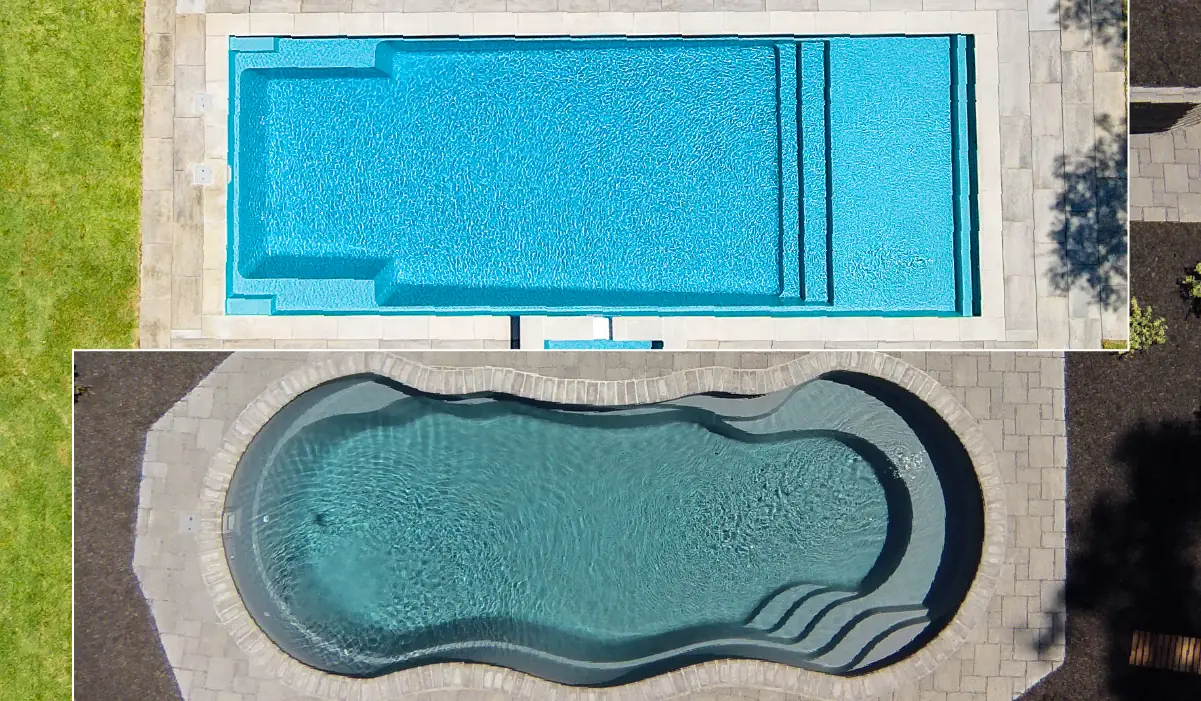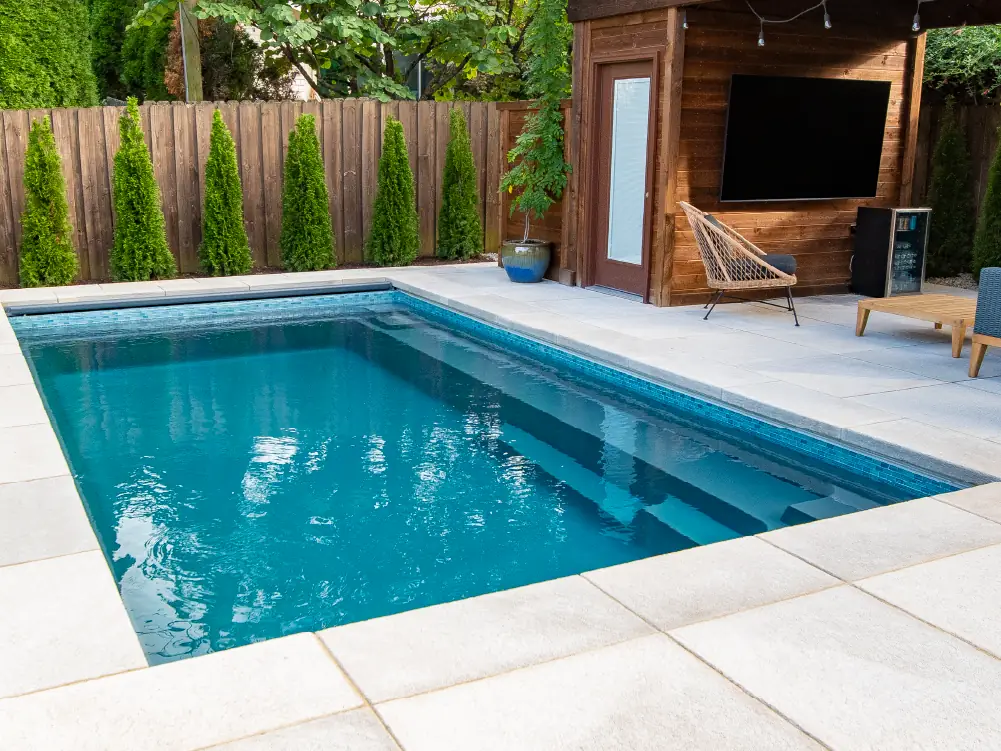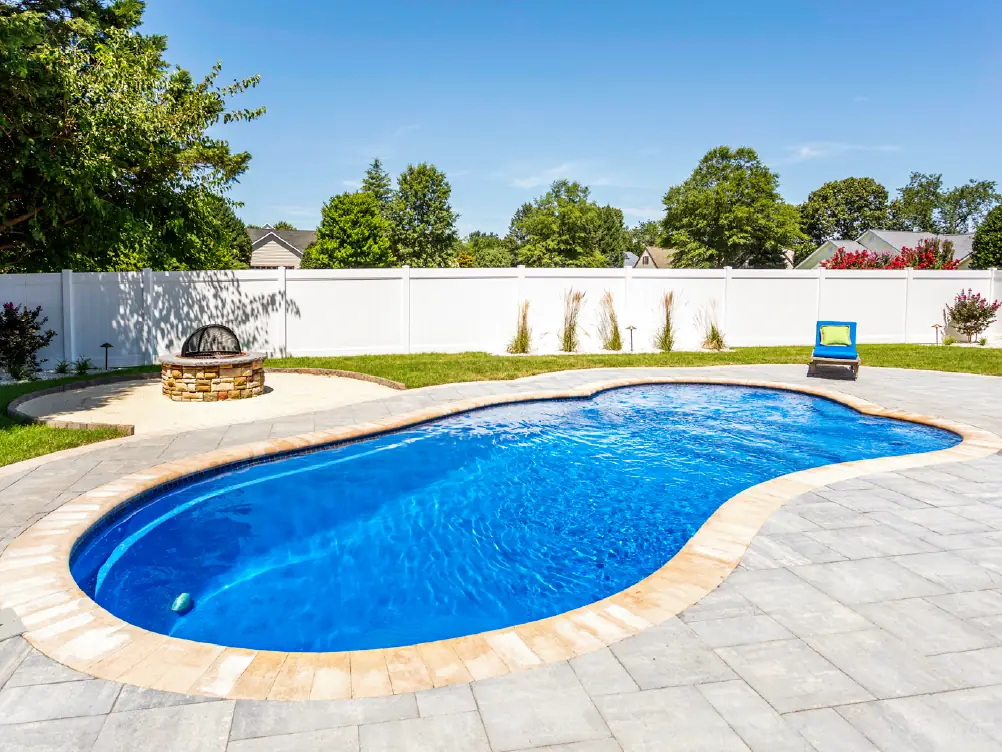
understanding the differences between linear and freeform pools: a guide for new home builders
When building a new home, one of the most appealing features you can offer your clients is a beautiful, high-quality fiberglass pool. Pools not only enhance the aesthetic appeal of a home but also provide a relaxing retreat and a great spot for entertaining. As you explore the options available, you’ll encounter two primary styles: linear pools and freeform pools. Each style offers distinct advantages and aesthetic qualities that cater to different tastes and needs. In this guide from Evo Pools, we’ll delve into the differences between linear and freeform pools to help you make an informed decision for your clients.
what are linear pools?
Linear pools, also known as rectangular or geometric pools, are characterized by their straight lines and sharp angles. These pools often feature a classic rectangular shape. However, they can also include variations such as L-shapes, T-shapes, and other geometric configurations.
advantages of linear pools
timeless aesthetic: The clean, straight lines of linear pools offer a timeless and elegant look that complements modern and traditional home designs alike. This classic appeal makes them a popular choice for many homeowners.
efficient use of space: Linear pools are highly efficient in terms of space utilization. Their straightforward design allows for easy placement in various yard sizes and shapes, making them a versatile option for different properties.
ease of maintenance: The geometric design of linear pools makes them easier to clean and maintain. The straight edges and smooth surfaces minimize the number of nooks and crannies where debris can accumulate.

optimal for laps and exercise: For clients who are fitness enthusiasts or enjoy swimming laps, the straight lines and uniform depth of linear pools provide the ideal environment for exercise.
compatibility with pool covers and accessories: The regular shape of linear pools allows for easy integration with automatic pool covers, pool fences, and other accessories, enhancing safety and convenience.
what are freeform pools?
Freeform pools, on the other hand, are designed with curves and flowing lines that mimic natural bodies of water. These pools are often custom designed to fit the unique contours of the yard and blend seamlessly with the surrounding landscape.
advantages of freeform pools
natural aesthetic: The organic shapes of freeform pools create a natural, lagoon-like appearance that can transform a backyard into a tropical oasis. This design is particularly appealing for clients who prefer a more relaxed and informal look.
customization potential: Freeform pools offer extensive customization options. Builders can incorporate features such as rock formations, waterfalls and beach entries to enhance the natural feel and create a truly unique poolscape.
integration with landscaping: The curved lines of freeform pools allow for better integration with landscaping elements. Trees, shrubs and flower beds can be strategically placed around the pool to enhance its aesthetic appeal and create a harmonious outdoor environment.

the differences between linear and freeform pools: choosing the right pool for your clients
When deciding between a linear and freeform pool, it’s essential to consider the specific needs and preferences of your clients. Here are some factors to keep in mind:
aesthetic preferences: Discuss with your clients their preferred style and how they envision their backyard oasis. If they lean towards a modern, clean look, a linear pool might be the best choice. For those who desire a more natural and relaxed setting, a freeform pool could be ideal.
space and layout: Evaluate the available space and the layout of the property. Linear pools are excellent for maximizing limited space, while freeform pools can be designed to fit around existing landscape features.
usage and activities: Consider how your clients plan to use the pool. For exercise and swimming laps, a linear pool is more practical. For varied recreational activities and a more playful environment, a freeform pool offers greater versatility.
maintenance and upkeep: Discuss the maintenance requirements with your clients. While both types of pools require regular care, the straightforward design of linear pools can make maintenance slightly easier.
budget considerations: Budget is always a critical factor. Linear pools generally have a more straightforward design and construction process, which can be more cost-effective. Freeform pools, with their custom shapes and additional features, might involve higher costs.
Both linear and freeform fiberglass pools offer unique benefits that can enhance the appeal and functionality of a new home. As a builder, understanding these differences will enable you to guide your clients in making the best choice for their lifestyle and preferences. By offering a well-informed recommendation, you can help create a stunning backyard retreat that your clients will enjoy for years to come.
At Evo Pools, we specialize in providing high-quality fiberglass pools that cater to a variety of tastes and needs. Whether your clients prefer the classic elegance of a linear pool or the natural charm of a freeform pool, we have the perfect solution to transform their backyard into a personal paradise. To learn more, connect with us today.
versatile recreation: Freeform pools provide varied depths and areas that can cater to different activities, from shallow lounging spaces to deeper sections for diving and swimming. This versatility makes them a great choice for families with diverse recreational needs.
soft and inviting atmosphere: The smooth, flowing lines of freeform pools create a soft and inviting atmosphere that can make the outdoor space feel more relaxing and enjoyable.